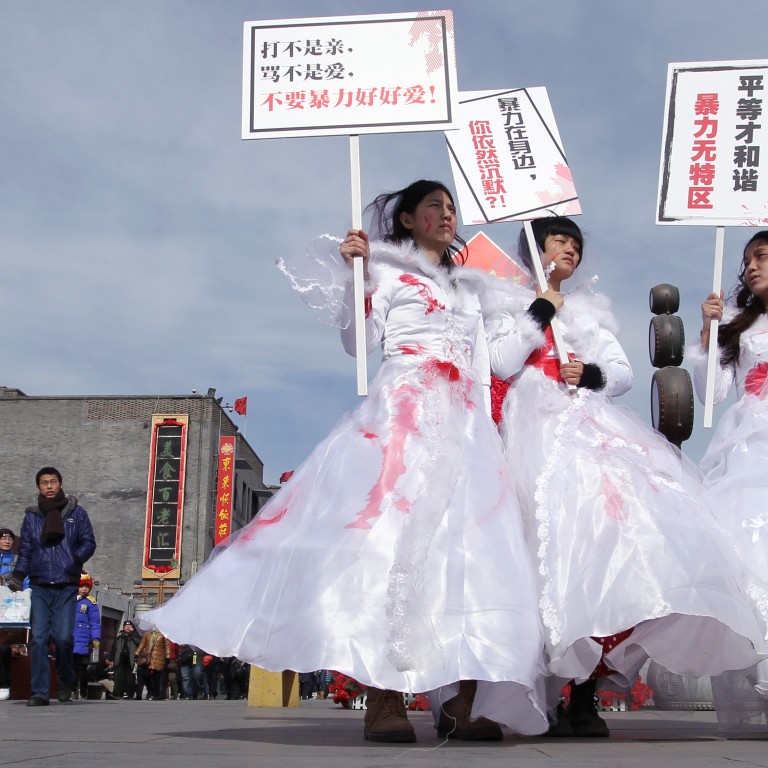
In Xi Jinping's crackdown on civil society, even women's rights activists aren't spared
Chang Ping says the detention of five activists marks a milestone in Xi's crackdown on dissent
Just before International Women's Day on March 8, Chinese police detained a number of women's rights activists in Beijing, Guangzhou and Hangzhou . Five of the activists - Li Tingting (better known as Li Maizi), Wei Tingting, Wang Man, Zheng Churan and Wu Rongrong - are suspected of "picking quarrels and provoking troubles", a charge police have used in recent years to target dissidents. The women were planning to protest against sexual harassment on public transport.
The five are thought to be the first people in modern Chinese history to be arrested for championing women's rights.
Wang Zheng, a professor of women's studies at the University of Michigan, said China's first large-scale women's rights movement took place in the midst of the 1911 republican revolution, but it was crushed soon after Yuan Shikai took power a year later. Until March 6 this year, his was the only government in Chinese history to have openly cracked down on the feminist movement. The "tragedy of history repeating itself" a century after the historic movement is reason enough for Chinese feminists to unite in opposition, Wang said.
Women's rights and gender equality groups in Hong Kong and elsewhere have called on the Chinese government to release the activists. Demonstrators have also taken to the streets in London, Seattle, New York and other cities to protest at Beijing's actions.
This kind of global protest no longer fazes the Chinese government, of course. Even so, the crackdown we see here is something new.
During the cold-war years, socialist countries liked to profess their support for gender equality to flaunt the superiority of leftist thinking. In China, International Women's Day was used by the government to show off women's status in society and their contented lot. Women were to be pampered on this day, and some workers' unions would give the women towels, film tickets, sanitary products and even a half-day holiday.
Given jobs of their own, women in socialist countries have come to depend less on men and their family. Yet, like men, they have been turned into government-controlled labour resources and political tools. The crony capitalism and consumerism that have taken hold in Chinese society have also brought more problems for women.
In recent years, some young women who see the need to carry on the fight for women's rights but are unwilling to retread the old paths have been experimenting with different ways of getting their messages across, within limited means and while taking care not to anger the authorities. Using new media and street rallies, the campaigns they have organised so far - to "Occupy the men's toilets", oppose sexual harassment on public transport and protest against gender-biased recruitment by companies, for example - appear innocuous. However, both the way they operate and their sharp criticism of Chinese patriarchy and the authoritarian political regime it props up have put the women in as much danger as the other rights activists.
Since taking power, Xi Jinping has shown no mercy in his crackdown on dissidence and protest movements: the groups New Citizens Movement, Transition Institute, China Rural Library and others were shut down; activists Xu Zhiyong, Ilham Tohti and Liu Ping have been jailed, while Pu Zhiqiang , Gao Yu and Guo Yushan are awaiting trial in detention.
Meanwhile, Xi's China Dream may be better described as a "Dream of a Patriarchal Empire", in the way it exhorts women to promote family virtues and cultivate good family traditions.
Xi pressed the point in his Lunar New Year speech, which the mainland media summarised as putting the focus on "family values, family education and family traditions". Not surprisingly, filial piety was a major theme of the CCTV Spring Festival Gala. On top of the usually blatant prejudice displayed in the programme in terms of people's looks and age, this time there was also a liberal dose of sexist jokes and references, all trumpeting a woman's proper place as a wife and mother.
A group of feminists wrote to the state media regulator to demand the spring festival gala be cancelled in favour of alternative entertainment. They criticised the show as a poor attempt at ideological control. But their protest was rejected, and itself became a target of attack by many men.
China's propaganda machine has time and again rejected Western democracy and constitutional rule as being unsuitable for China, but has yet to pin this label on the women's rights movement. The 1995 UN Women's Conference in Beijing was a milestone in the global women's movement. To mark its 20th anniversary, China has even announced it would co-host, with UN Women, a "Global Women's Summit" in New York in September.
